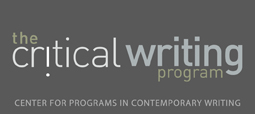Penn Professors on Writing in Cognitive Neuroscience
Dr. Sharon L. Thompson-Schill

About the Professor
Cognitive neuroscientist Dr. Sharon Thompson-Schill is a Professor of Psychology at the University of Pennsylvania, the Director of Undergraduate Studies for the Psychology Department, and the Director of Penn's Center for Cognitive Neuroscience. She teaches Introduction to Cognitive Neuroscience and the Senior Honors Seminar in Psychology and has been recognized as a "Hall of Fame Professor." Her listed publications feature over 70 research articles.
What kinds of writing do you do or are you doing right now?
"This month, with student co-authors, I am writing approximately six empirical research articles, which will be submitted to scientific journals geared towards a specialist audience; with faculty colleagues, I am writing two grant proposals that describe recent and planned research projects, which will be submitted to federal agencies; with two postdoctoral fellows, I am writing a chapter in an "encyclopedia of cognitive neuroscience" geared towards an undergraduate audience; and, in the rest of my time, I am writing about 200 emails a day!
How would you describe your writing process, e.g., pre-writing, drafting, organizing materials, revision, outside readers for feedback? Does your writing process vary based on the type of writing you do?
I still have notepads and pens on my desk, in my bag, and strewn around my home office. Yes, I also have a computer, but I find that I don’t think well in front of an open Word document. I need a pen in my hand, and a lot of scribbles and arrows on a piece of paper to think. I have found that the more planning I do in advance, the easier it is to produce a really coherent first draft a bit later. Also, I try to give myself the luxury to write when it feels right. Some days, it is too much of a struggle, so if I have allowed myself enough time before deadlines, I can find something more successful to do on those days, and wait till I am really "feeling it" to turn my notepad full of ideas into good prose. (Of course, sometimes I have to just get something done on time, so I have also had to learn to push through when I don’t have the luxury of time.) I love to read things I have written, before they are finalized, weeks after I last looked at them. I learned this early in my career, because in the journal submission process, feedback from an editor on a first draft often arrives 2-3 months after the original submission, and when I set to the task of revising the manuscript, the temporal distance makes me much less attached to some of the bad ideas in the first draft. I realized that I am a much better editor of my own work when I have a break from thinking about it. Again, with the luxury of time and advance planning, I try to always allow myself a day off before finalizing anything I write. (Except those 200 emails.) Lastly, for a lot of my writing, but especially when writing for a more general or lay audience, I always read what I've written aloud. I have an easier time hearing problematic text than seeing it.
Can you name a few writers in your discipline that you regard as exemplary?
"I’ll just name one. Before reading the work of Lila Gleitman (retired Penn professor), I thought scientific writing had to be dry and styleless, that the author should not have a voice. Reading Lila's scientific writing (which is always instantly recognizable as Lila's) gave me the courage to find, and then use, my voice."
Do you have any tips for undergraduate student writers when writing for you or other faculty in cognitive neuroscience?
"This may sound obvious, but I would say don’t try to write about something you don't (yet) understand. Spend time talking about the ideas, in a very informal way — with your professor, your TA, your friends, your cat — before you try to turn those ideas into something more formal and more polished. Otherwise the end product ends up reading like an empty bag of words."
Which citation style do you use and prefer? Are there any common errors students make in using that style?
"APA is easy to use and fairly standard, so it is what I recommend. But the important thing is to pick some citation style and use it consistently. Now, with software like Zotero, citing correctly and consistently is easy, which frees up more time to do the more interesting parts of writing."
Links
Back to Writing in the DisciplineOther professors in cognitive neuroscience: Dr. Martha J. Farah
© 2013-2014 The University of Pennsylvania
